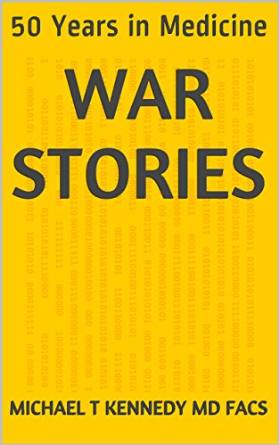
I have a new book out on Kindle that is now published. It is called “War Stories: 50 Years in Medicine.”
I’ve been working on this for 20 years and kept having to revise it as I would put it down and then go back to it after ten years. I finally decided to rework it and publish it two years ago. My students were reading the draft on my laptop while I was editing so maybe it will be interesting.
It is a memoir of patients. They are all patients’ stories that I have tried to describe accurately and to describe what we did then. Sometimes I screwed up and I tell those, too. Sometimes we did the best we could and we now know better. Some of these cases are still hard to explain.
Two of them, in the chapter on Melanoma, are about young women who developed major melanoma metastases years after the primary was excised but when they had become pregnant. The melanoma went wild in pregnancy, in one case ten years later. In the other, three years after I had removed the primary, she developed extensive metastases while pregnant. She refused abortion and I thought it would cost her her life. In both cases the melanoma vanished after pregnancy ended. In one case, the woman, last I heard, was free of melanoma 25 years later. The other was free ten years later. The medical literature says pregnancy has no effect on melanoma. Neither ever became pregnant again.
Another case is an example of the only supernatural near-death experience I have ever heard.
The book starts when I began medical school in 1961 and describes experiences with patients, including my summer working with schizophrenic men in 1962. I have a series of stories about patients I saw as a student and sometimes intersperse stories from later that are about similar cases and events. One that is amusing, I guess, is about my very first pelvic exam, on a 40 year old prostitute who had just gotten out of prison and enjoyed it thoroughly. I had a dozen student nurses as witnesses. I do have some biography in it but try to keep it to minimum.
After the first eight chapters, I go on to residency and then finally to private practice. I continued to teach and there are a few of those stories. There is a chapter on ethics including my thoughts on euthanasia and “benign neglect.” Toward the end of my career, I started and ran a trauma center in our community hospital. I also did a fair amount of testifying in court in both trauma cases and some civil cases where I testified for plaintiffs and for defense. I consider it a compliment that Kaiser Permanente had me testify for their defense even though I had also testified against them.
Anyway, the book is on Kindle and I hope somebody is interested. It has some similarity to my medical history book, which I plan to do a Kindle version of once this one is launched. In this one, I spend some time explaining the diseases in a way that I used to explain to patients and I still do to students. Without some basic understanding, most of these stories would not make sense and I hope the explanations are not too dull. If so, all comments are welcome. If anyone likes it, feel free to post a review on Amazon. Two reviewers from the first book in 2004 told me to let them know if I did another one and I have contacted them.
If anyone wants to discuss the book here, feel free to add comments.


